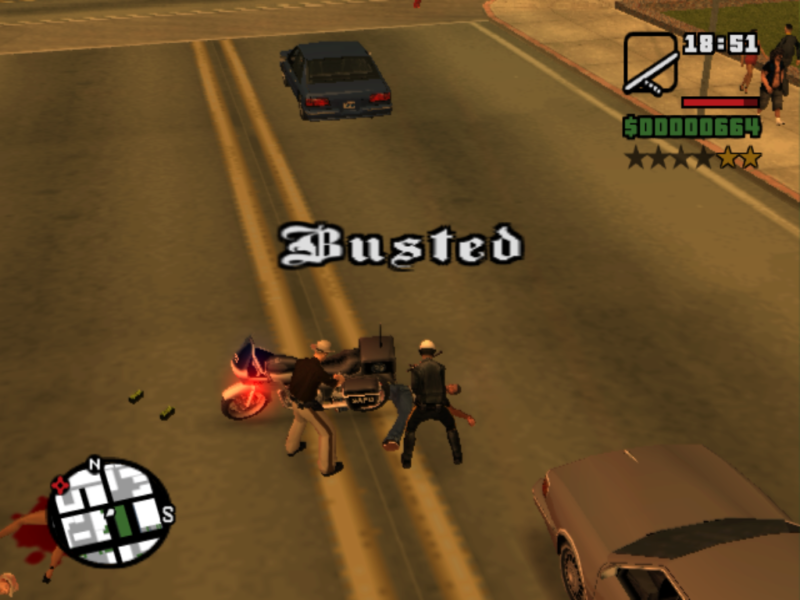
When an Australian gamer called “Anti” completed a full playthrough of Grand Theft Auto: San Andreas in a scant four hours, the feat almost seemed impossible. Yet any fans of speedrunning—an activity where die-hard players jockey to complete the game as quickly as possible, with different rulesets forming discrete “categories” of competition—could see this incredible “run” for themselves on the game’s leaderboards. Anti had posted the entire thing online.
An old saying may be coming to mind, and yes: it was too good to be true. A fellow competitor started analyzing Anti’s videos to optimize their own in-game routes, but they noticed that several vehicles in these runs left a faint smoke trail when they accelerated. Since no other runs on the GTA: San Andreas speedrun leaderboard evinced this telltale exhaust, this competitor began to wonder: was Anti somehow messing with the game in order to pull off this record-breaking time?
In the PC versions of the GTA games, after all, the files that control the way cars perform are easily accessible via a plain text editor like Windows Notepad. Game fans know this. And by slightly boosting certain variables to make cars accelerate ever-so-slightly faster, this fellow speedrunner was able to recreate the smoke effect in Anti’s runs. Soon, several runners started complaining to the greater community; someone even created a slick montage full of evidence that Anti had modified the game in order to shave vital seconds from their records.
In August 2018, the leaderboard moderators finally felt compelled to act, announcing a one-year-ban for “Anti” due to suspected cheating. The decision sent shockwaves reverberating through this tiny clique of GTA speedrunners, especially since Anti was an accomplished runner in the scene. At the time, Anti held several world records in each game in the series.
Gotta go fast
Ever since the first two hopeless MIT geeks battled it out in primitive progenitors like Spacewar!, video game players have cast their hobby as a form of heated competition. But while it’s the behemoths like Valve that finance the glittering million-dollar tournaments for esports like Dota, on the grassroots side of the spectrum, there’s a vibrant scene of gamers who pour their hours into an entirely different competition: that of “speedrunning.”
Since the mid-2010s, speedrunning has exploded in popularity as a pseudo-spectator sport, thanks largely to the annual charity event Awesome Games Done Quick (celebrating its tenth anniversary this January), where runners are invited to show off their skills on-stream to raise funds for organizations like Doctors Without Borders. Outside the outsized spotlight of this biannual spectacle, however, the competition rages on platforms like Twitch, where determined runners stream their attempts to break into the all-important leaderboards hosted on Speedrun.com. However, in certain walled-off corners of this tiny world, members of the community have begun to publicly question the legitimacy of certain competitors and records, wrenching open a Pandora’s box of controversy that some runners feel threatens the entire foundation of the hobby as they know it.
In many ways, Anti’s faked GTA runs might stand as a microcosm of the ever-present spectre of cheating that has lurked under the surface of the hobby for years now. Speedrunning fans know the script: first came the announcement, then a half-hearted apology, where Anti admitted that at least some of the runs were cheated. Next came the backlash against the moderators from fans of Anti’s streams, who stated that the apology was a sign of growing maturity. That was, of course, followed by the backlash to the backlash, when the moderators decided to make the ban permanent after analysis of Anti’s older runs concluded that the speedrunner’s confession was far from complete and that the cheating was far more widespread than initially claimed. Eventually, after the initial explosion of drama, Anti’s runs were scrubbed from the GTA charts, and the controversy ebbed away.
According to YouTuber Ben “Apollo Legend” Smith—himself a divisive figure in the world of speedrunning, largely due to his fiery fusillades against some of the biggest players in the space like GDQ—incidents like these are part of a growing trend of trusted, even prominent runners being exposed as fraudsters in sub-communities that they themselves helped build. But while the level of scrutiny that Smith and fellow content creators bring to bear on these alleged cheaters is certainly a new development, the concept of cheating is not. In fact, it’s almost as old as the hobby itself; one GoldenEye 007 runner was faking his runs as early as the late ‘90s. So as the world of speedrunning continues to grow larger and larger today, Smith worries that the methods that cheaters employ will only grow more sophisticated—and, with enough time, perhaps they will become entirely undetectable.
“I think people have probably been cheating as long as speedrunning has existed,” Smith says. “I think it’s only natural. But as more people come into the hobby, that number only grows. It’s a pretty big problem, in my opinion.”
https://arstechnica.com/?p=1635307

